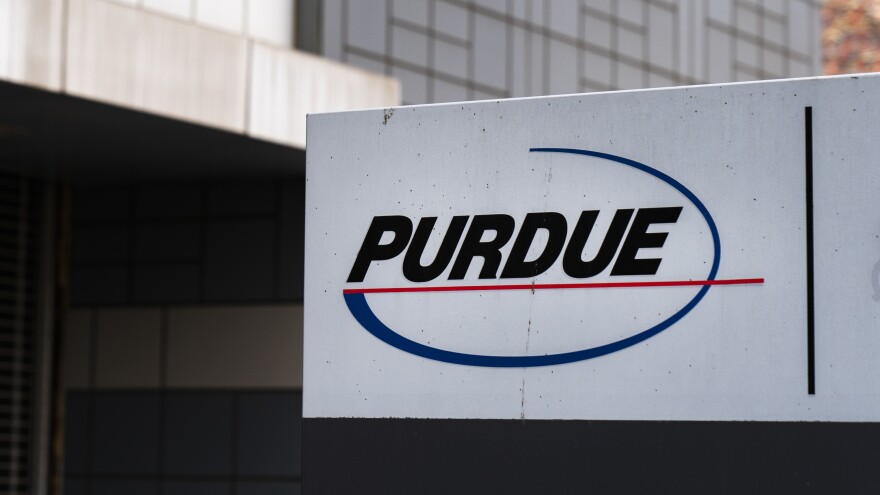Updated at 5:37 p.m. ET
Confronted with a torrent of lawsuits across the U.S., several major drug companies are in discussions with authorities to resolve thousands of opioid-related suits filed against them. A government source close to the negotiations tells NPR that Purdue Pharma, Johnson & Johnson, Endo International and Allergan are looking to cut deals.
The health care giants are currently holding talks with attorneys general, attorneys representing local governments and Judge Dan Polster of the Northern District of Ohio, who is overseeing the consolidated federal trial, according to the source.
Purdue Pharma has confirmed to NPR that global settlement talks are underway that would resolve all claims against the company. Published reports suggest the deal could involve payments of up to $12 billion and a bankruptcy process that would force the Sackler family to give up ownership of the company.
It's unclear whether any Purdue Pharma settlement would include a clear admission of wrongdoing.
Also unclear is whether a deal would include a secrecy provision similar to past settlements agreed to by the company and government officials that kept most details of the Sackler family's activity hidden from the public.
In a statement issued Wednesday, Massachusetts Attorney General Maura Healey said she would oppose any confidentiality agreement.
"For years, members of the Sackler family tried to hide their role in creating and profiting off the opioid epidemic," Healey said. "We owe it to families in Massachusetts and across the country to hold Purdue and the Sacklers accountable, ensure that the evidence of what they did is made public, and make them pay for the damage they have caused."
Ohio Attorney General Dave Yost's office also confirmed that he is in talks with Purdue, telling NPR that "Yost is at the table and actively engaged in discussions" with the OxyContin manufacturer.
Johnson & Johnson wouldn't confirm specifics of the Ohio talks, but the company sent NPR a statement saying that it "remains open to viable options to resolve these cases, including settlement."
Endo and Allergan have reached tentative settlement deals, the government source says.
There are roughly 2,000 cases in the consolidated lawsuit, called the National Prescription Opiate Litigation, that is pending before Polster in Ohio. The sprawling Ohio case against 22 opioid manufacturers and distributors is expected to begin in October if the parties do not reach a settlement.
Dozens of state attorneys general have also chosen to file their own separate lawsuits against Purdue and other major pharmaceutical companies.
Finalizing any settlement will not be simple, partly because state and local officials are having difficulty determining who would control any monies generated by these lawsuits and how they would be spent.
Many county-level plaintiffs have been advocating for a plan that would expand the federal case in Ohio to include a "negotiating class" of tens of thousands of local governments. This arrangement, they say, would let them more effectively distribute any settlement money at the local level.
But many of state attorneys general — including Yost — have vehemently opposed the proposal to create a negotiating class, even going so far as to file amicus briefs with Polster's court arguing against it.
Yost himself has suggested a different proposal for Ohio alone, one that would place more power in state officials' hands. However, officials in Summit County, at least, have already rejected it as "unconstitutional and an inappropriate use of legislative authority."
News of the broader settlement negotiations comes two days after Johnson & Johnson lost a state opioid case in Oklahoma. The judge in that case awarded the state roughly $572 million to help it "abate the opioid crisis," though Oklahoma had asked for much more — $17 billion — to fund a 30-year plan to combat opioid addiction.
Judge Thad Balkman felt the state failed to offer "sufficient evidence of the amount of time and costs necessary [to the plan], beyond year one."
Still, in his ruling, Balkman asserted that by deceptively marketing its painkillers, the health care giant "caused an opioid crisis that is evidenced by increased rates of addiction, overdose deaths and neonatal abstinence syndrome in Oklahoma."
Johnson & Johnson has announced that it plans to appeal that judgment.
Copyright 2021 NPR. To see more, visit https://www.npr.org. 9(MDA5NTM4MTIyMDE0MTg3NDc2MTVlZjdmNQ001))








